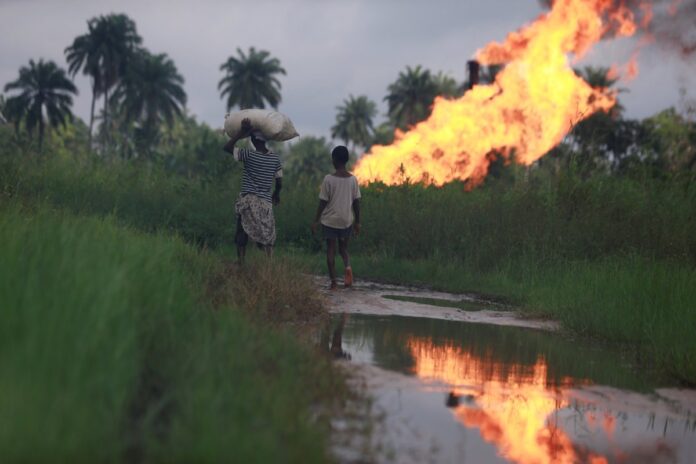A recent report by the Human and Environmental Development Agenda (HEDA) has unveiled the devastating consequences of oil exploitation in Bayelsa State, sparking fresh outrage over the plight of the Niger Delta’s most vulnerable communities.
The report, titled “On-the-Spot Assessment of Oil and Gas Exploration Activities in Bayelsa State, Nigeria,” paints a grim picture of the environmental and health crises facing residents. It highlights a dismal tale of polluted waters, toxic air, eroded farmlands, and lost livelihoods, all fueled by unchecked oil activities.
The Numbers Behind the Nightmare
According to the report, a staggering 70.2% of respondents attribute the environmental degradation in Bayelsa to oil and gas operations. Water pollution emerged as the most prevalent issue, affecting 55.7% of those surveyed. Air pollution (23.18%), soil contamination (15.92%), and other forms of environmental harm (4.84%) also ranked high.
Health implications have been equally dire. The report reveals that 79.24% of respondents and their families suffer from health problems linked to pollution. Communities in Kolokuma/Opokuma, Nembe, and Yenagoa, areas densely populated with oil installations, reported alarmingly high incidences of illnesses.
Anger at the Authorities
Residents express deep frustration with both the government and the oil companies. “The government has abandoned us,” said one respondent. Over 70% of those surveyed believe the government fails to hold oil firms accountable for the environmental damage.
Similarly, dissatisfaction with federal agencies was palpable. An overwhelming 81.94% of respondents described the government’s response to their environmental concerns as inadequate. “The agencies meant to protect us have become toothless bulldogs,” lamented a local activist during a focus group discussion.
Transparency and Accountability: A Long Road Ahead
The report also critiques the oil companies’ handling of asset divestments, particularly by Shell Petroleum Development Company (SPDC) and Nigerian Agip Oil Company (NAOC). A majority—67.13%—rated their handling as poor, with another 72.32% criticizing the lack of transparency in the process.
Community involvement was similarly lacking. More than 41% of respondents reported being excluded from decisions surrounding asset divestment, while only 0.69% said they were actively involved.
“The oil companies treat us as invisible,” a community leader from Southern Ijaw remarked. “They make decisions that affect our lives without our input or regard for our rights.”
HEDA’s Call for Action
Olanrewaju Suraju, Chairman of HEDA, issued a strong call for action. “The Nigerian Upstream Petroleum Regulatory Commission (NUPRC) must enforce stricter penalties for non-compliance by international oil companies (IOCs),” Suraju said. He stressed the need for transparency, community engagement, and robust health programs to address the crisis.
Suraju also advocated for technology-driven anti-corruption frameworks, saying, “We need to leverage technology to ensure transparency in remediation efforts and compensation for affected communities.”
Toxic Realities: Stories from the Ground
The report includes testimonies that underscore the human cost of the crisis. A farmer from Sagbama described how oil spills rendered his farmland barren. “I can’t grow crops anymore. My children are starving,” he said, visibly emotional.
Fishermen in Nembe recounted how contaminated waters had decimated fish populations. “Fishing was our lifeline. Now the waters give us nothing but poison,” one fisherman shared.
These personal stories add a poignant layer to the statistical findings, reinforcing the urgent need for systemic change.
The Bigger Picture: Ecological and Cultural Losses
Beyond immediate health and economic impacts, the report highlights long-term consequences, including biodiversity loss and the disappearance of traditional medicinal plants. Cultural practices tied to the land and water are also vanishing, leaving communities grappling with an identity crisis.
Environmentalists warn that if the current trend continues, Bayelsa’s ecosystem could face irreversible damage. “The Delta is bleeding, and no one seems to care,” said a representative from a local environmental group.
A Failure of Oversight
One of the report’s most damning revelations is the lack of awareness about regulatory mechanisms. A shocking 73% of respondents were unaware of the NUPRC checklist, a tool designed to ensure compliance by oil companies.
“This lack of awareness is both a failure of the government and the oil companies,” Suraju noted. “How can people demand accountability when they don’t even know the rules?”
A Glimmer of Hope?
Despite the bleak findings, HEDA’s report offers a roadmap for change. Recommendations include:
- Comprehensive environmental remediation programs.
- Long-term health studies and community-led health initiatives.
- Transparent and inclusive divestment processes.
- Sustainable livelihood programs and fair compensation for affected residents.
“Time is Running Out”
As Bayelsa grapples with the twin crises of pollution and neglect, the need for action has never been more urgent. “The findings of this research are a wake-up call,” Suraju concluded. “If we fail to act now, the ecological and economic future of Bayelsa—and indeed Nigeria—is at grave risk.”
The full report is available on the HEDA website, offering a comprehensive analysis and actionable insights for policymakers, oil companies, and civil society.

